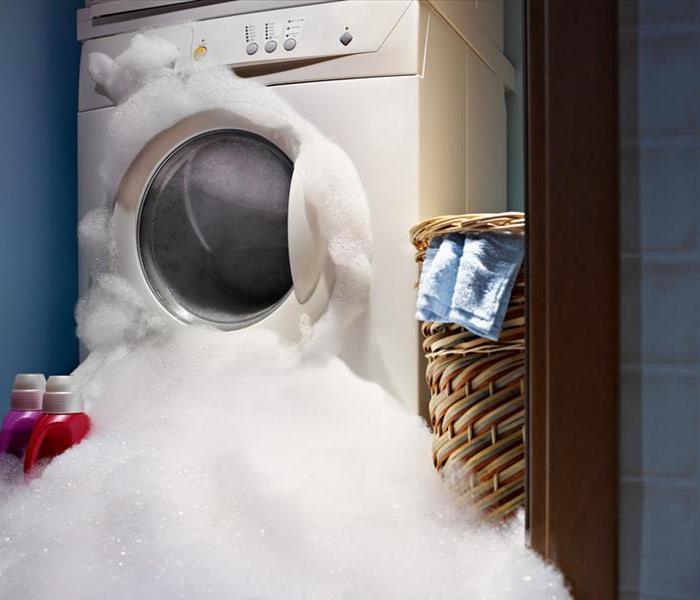Preventing a Water Damage Disaster from Your Washing Machine
2/9/2023 (Permalink)
There are a number of events that can occur leaving water damage from a washing machine. A busted washing machine hose, overloading your laundry, seals and other damages can potentially leave you with water damage. Preventative measures keep this from happening by reducing the risk of a water damage disaster caused by washer machines.
Washing Machine Water Damage Prevention
Make sure you don't overload your washing machine. The maximum load size is marked on the washer's door or inside of the drum and should not exceed 2/3 full at any time. Overloading can cause excessive vibrations which may cause damage to your washing machine, or even worse, could make it tip over while it's running!
Regularly check for faulty hoses that lead into drains and replace them as soon as possible if they are cracked or damaged in any way (however small).
Check for Faulty Drain Hoses
To prevent a flood and other water damage, it's important to check your washing machine for faulty drain hoses. There are many ways that a drain hose can become damaged—cracks, corrosion, holes and even rusting. You should also look for any signs of wear or damage such as cracks or leaks.
If you notice any of these issues with your washing machine's drain hose, it may need to be replaced. This can save you money down the road because it would otherwise be necessary to replace only individual parts instead of everything at once!
Don’t Overload Your Washer
Don’t overload your washing machine. As a general rule, you should not wash more than 5-6 pounds of clothing in a full load and 2-3 pounds in a half load. Don’t wash too many clothes at once. The more clothes you load into the washer, the longer it takes to fill up with water and start washing them. Washing too many pieces at once can also put undue stress on your machine by causing excessive vibrations or adding excess weight and pressure to its components such as bearings and springs.
Check the Seal of Your Washer
Check the seal of your washer. If you haven't already, open the door and check the rubber seal around its opening. If it's torn or missing, a lot of water will leak from your washing machine when running. This can lead to mold or mildew problems that get into your walls and floors, which is definitely something you want to avoid.
If you have had a problem with your washing machine over time (ejecting clothes, leaking), be sure to check this area closely for any tears or holes that may have been caused by an unfortunate run-in between a heavy object and some part of the interior compartment of your washing machine during operation.
Regularly Checking and Replacing Hoses
How often should you check your washing machine hoses? The recommendation is to do so every six months, but it’s better to be safe and check them more frequently. If you have hard water or live in an older house, you may want to check them monthly.
How long should a washing machine hose last? Hoses can start to crack after three years of use, so it’s important that you replace them before this happens. If any part of the hose appears cracked or damaged, it needs replacing immediately for safety purposes.
There are simple things you can do to prevent water damage from your washing machine. It’s important to keep in mind that this is a serious issue and it could potentially cause thousands of dollars in damage if something goes wrong. If you take the proper steps, then you will not only be saving yourself money but also time since there will be no need for costly repairs or restoration services.






 24/7 Emergency Service
24/7 Emergency Service
